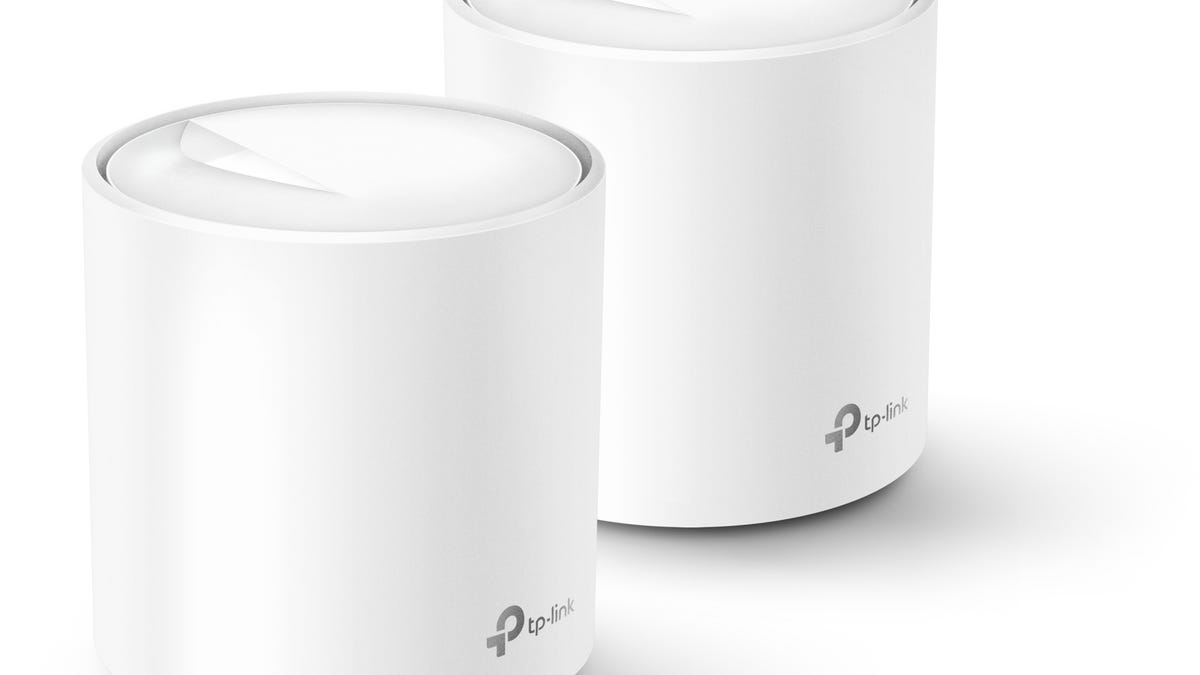TP-Link's Deco mesh routers get a Wi-Fi 6 upgrade in 2020
TP-Link brought a few new Wi-Fi 6 mesh router systems to Las Vegas this year. Here's the skinny on all three of them.

At less than $200 for a two-piece system, the TP-Link Deco X20 Wi-Fi 6 mesh router goes on sale this March.
After leaving us hanging for details in 2019, TP-Link is taking to the CES 2020 show floor to debut new Deco mesh router systems that support 802.11ax -- also known as Wi-Fi 6.
With Wi-Fi 6 support, the new Deco systems will offer faster top speeds than before. The fastest among them (and the most expensive, at $450 for a two-pack), is the TP-Link Deco X90, a tri-band mesh router with speeds of up to 574 megabits per second on the 2.4GHz band, 1,201Mbps on the 5GHz band and 4,804Mbps on a second 5GHz band that the system uses for a dedicated backhaul connection between the main router and the satellite devices, which you'll scatter about your home to spread a speedy Wi-Fi signal from room to room.
Read more: Best internet providers in 2020
Locating local internet providers
The fastest of the new Deco systems, the Deco X90, goes on sale in April.
The first of the two other new systems is the dual-band TP-Link Deco X60, which eliminates the backhaul, but still offers top speeds of up to 2,402Mbps on the 5GHz channel. That one brings the cost down to $270 for a two-pack.
A third system, the dual-band, budget-priced TP-Link Deco X20, is even less expensive, with a tempting price tag of only $190 for a two-piece setup. Speeds are capped at 1,201Mbps on the 5GHz band, but that's still significantly faster than the previous-gen Deco P9, which capped things at 867Mbps.
Locating local internet providers
"These new TP-Link Deco Mesh offerings leverage cutting-edge Wi-Fi 6 technology to deliver the ultimate Wi-Fi mesh experience," said Louis Liu, CEO of TP-Link USA. "By combining mesh Wi-Fi and Wi-Fi 6, you not only increase the connection speed of your devices but also dramatically improve the network capacity and efficiency, making it the perfect solution for users with smart devices throughout their homes."
In our initial batch of Wi-Fi 6 mesh tests, we found that routers like these tend to perform better at range, much of which is likely due to the fact that the router and satellite are able to transmit data back and forth using next-gen Wi-Fi 6 features and speeds. That's true even if you're living in a home without any other Wi-Fi 6 devices at all.
Later this year, TP-Link will release the Deco X96, a tri-band mesh router that supports Wi-Fi 6E.
All three of the new Deco systems support key Wi-Fi 6 features, including OFDMA, 1024 QAM and both outgoing and incoming MU-MIMO connections. You can click those links to see more about what that means, but the short of it is that these routers are equipped to move data faster and more efficiently than previous-gen hardware. The new systems all support the latest WPA3 encryption standards, and include support for voice controls via Amazon's Alexa, too.
The other thing to watch for is whether or not all of the new routers and mesh systems making their debut at CES support Wi-Fi 6E, which would indicate that they're equipped to take advantage of additional bandwidth on the 6GHz band that appears likely to be opened up for Wi-Fi usage in 2020. TP-Link tells me that it will have a Deco X96 AX6600 Tri-Band Mesh model that supports 6E coming out later this year.
No word on when, exactly, that model would hit the market, but look for the rest of TP-Link's new routers to appear in stores this spring, with the Deco X20 and X60 systems set to go on sale in March and the higher-end X90 system slated for an April release.
TP-Link's Archer lineup is getting a couple of new Wi-Fi 6 routers this year, too, including the AX90, seen here.
Not just mesh
In addition to the new Deco systems, TP-Link also plans to launch a host of other products supporting Wi-Fi 6 this year. Chief among them are a new dual-band AX1500 Wi-Fi 6 range extender (model number: RE505X) that'll sell for $70 starting this March, as well as two new AX6600 tri-band routers for the Archer lineup: the $300 AX90, which hits stores in April, and its gaming-centric sibling, the $330 GX90. Look for that one to debut by the end of this summer.
The TP-Link Archer TX3000E will equip your PC with antennas for Wi-Fi 6 and Bluetooth 5.0 for $50.
Each of those routers comes equipped with eight antennas and three different Wi-Fi bands that allow for top speeds of up to 4,804 Mbps. The only real difference is that the GX90 can dedicate one of those three Wi-Fi bands to gaming traffic only (that, and it has the same, spidery design as previous-gen TP-Link gaming routers). It also includes gamer-friendly features like device prioritization and a latency log.
Also aimed at gamers -- the new TP-Link Archer TX3000E PCl-E Adapter. Plug it into your gaming PC to upgrade that device with new Wi-Fi 6 antennas of its own, plus Bluetooth 5.0 antennas for smooth connections with the latest game controllers and wireless accessories like headphones. That'll cost $50 when it hits retail later this month.
Originally published Jan. 5.
Update, June 10: Corrected an error indicating that the Deco X60 includes a multi-gig WAN port, which it does not.

